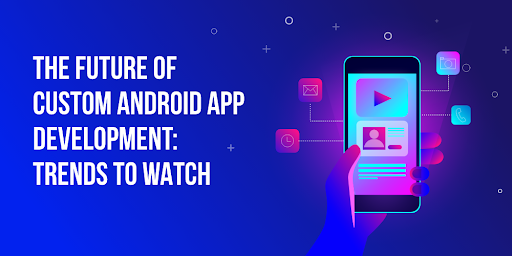The advancement of technology has elevated the use of smartphones because of the convenience it provides to users within a few clicks. Plus, the development of mobile applications has become one of the engaging marketing channels for businesses. From fulfilling the basic requirements to luxury, a mobile app can do anything and everything.
It is quite evident that a mobile application is necessary for every entrepreneur who wants to elevate their business growth. While talking about mobile app development, two widely known operating systems come to mind- Android and iOS. However, when it comes to picking anyone, business owners mostly prefer custom Android application development.
The Android operating system has several benefits, like customization features, lesser marketing time, and open-source that makes it the preferred choice of business owners. If you want to thrive your business at an unprecedented rate, you must stay aware of the ongoing trends. Besides understanding the latest trends, you should also know the cost to develop an Android app to ensure that it will align with your budget.
In this blog, we will have a look at the ongoing market trends of Android app development. Before moving further, let’s have a look at the top advantages of Android application development.
Advantages of Android Mobile Application Development
Android has a large user base that makes it a profitable platform for app developers. The huge user base of the Android platform delivers significant potential to its audience, generates higher revenue and ultimately contributes to the app’s success.
Developers can easily access a wide variety of resources, tools, and libraries for developing the app because Android is an open-source platform. This feature of the Android operating system provides innovation that encourages developers to build feature-rich and tailored-made Android apps.
- Diverse Hardware and Device Ecosystem
Android is accessible on multiple devices, like smartphones, smart TVs, and wearable devices. The diversity of Android allows developers to target different hardware capabilities that helps to reach a large number of audiences easily.
- Marketplace Accessibility
Android apps are published on one of the largest and most popular app marketplaces globally- Google Play Store. It conveniently distributes and monetizes your apps utilizing various revenue models such as paid apps, in-app purchases, and advertisements.
- Customization and Flexibility
Android has a greater flexibility when it comes to app design and functionality. Developers can easily customize the UI, incorporate third-party services, and build mobile apps that integrate with the Android operating system. The flexibility of Android allows for more creative and unique app experiences.
The Latest Trends for Android Application Development
The first trend of Android app development is instant apps introduced by Google. The primary goal of instant apps is to let users access the application’s functionality without the installation, leading to more app installations. This technology is majorly useful in eCommerce and gaming niches.
By installing Instant apps users can play games for a short period of time that enables them to make decisions of whether they should download the app or not. The apps come with engaging UI/UX design, compatibility with many devices, and more. Crossword app (release of New York Times) is one of the excellent examples of instant apps.
Another trend in Android applications is the rise of 5G technology that significantly focuses on increasing the internet connection’s speed and capacity. The 5G technology enables the users to install the app and upload data at a faster speed with high-definition video. It also allows them to play online games without any interruption, and leverage the features of the latest technologies, like AR and VR.
The integration of 5G technology in Android applications can open new doors of better opportunities and increase the demand for data-centric app solutions. The 5G network will evolve and become better with time, which will give developers the power to build unique & innovative applications.
- Use of Artificial Intelligence and Machine Learning
Implementing AI and ML into Android mobile apps has witnessed a dramatic increase in terms of popularity. Both Artificial Intelligence and Machine Learning boost the app’s functionality by providing custom recommendations that lead to excellent UX. It focuses on automating tasks and making apps more smart & highly responsive.
Artificial Intelligence and Machine Learning can also deliver interactive user experiences by integrating features, like chatbots, virtual assistants, and predictive text input. Also, these two technologies have robust security by offering features, like fingerprint touch or face recognition.
Blockchain is an evolving technology and will continue to grow as it can optimize operations, guarantees security, and builds trust among partners. The future of information technology will be completely decentralized. As a cutting-edge technology, Blockchain offers numerous advantages, like privacy, excellent speed, and transparency.
By 2026, Blockchain will become more secure as Android applications, like healthcare or financial services, leverages Ethereum for storing the data and completing the transactions.
IoT stands for the Internet of Things refers to the interconnection of devices, such as sensors, cameras, or appliances that are embedded with internet connectivity. IoT enhances the automation & control of physical devices via mobile applications.
IoT-enabled devices help in increasing efficiency and automation through integration with IoT devices. For instance, you have a smart home app that can control & monitor devices, like lights or CCTV cameras. Smartwatches are also one of the successful examples of IoT devices that let users track their physical activities or monitor vital health-related signs.
Final Words
The future of custom Android app development has exciting possibilities and innovations. And, as we delve into the latest trends in Android app development, we see a world of opportunities evolving.
For instance, instant apps are changing the way users interact with applications, offering a seamless experience without the need for installation. The rise of 5G technology is set to revolutionize the speed and capabilities of Android apps, enabling high-definition content and immersive technologies like AR & VR.
As you embark on your Android app development journey, the key to success is adapting to change, embracing innovation, and staying customer-centric. The future of custom Android app development is a dynamic and promising one, offering boundless opportunities for those ready to explore and innovate.







